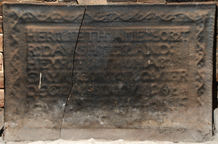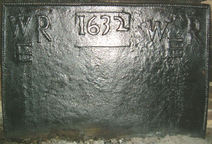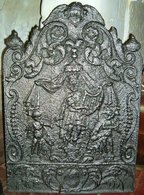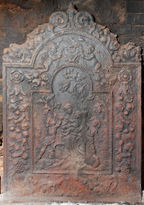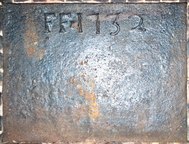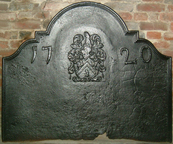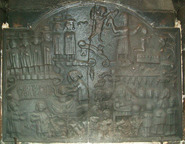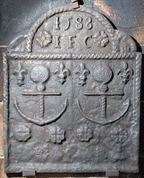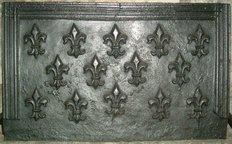-
1052
Description: Rectangular; rope edging on top and sides; central inscription panel; repeated trailing vine decoration from impressed wooden strips — one horizontal line at top, one vertical strip at each side.
Notes: The inscription panel is identical to that on the memorial plate to Anne Forster in Crowhurst church, Surrey; at least ten other firebacks are known with the same inscription panel. Formerly at Stonelands, West Hoathly.
Inscription: HER : LIETH : ANE : FORST/ R : DAVGHTER : AND : / HEYR : TO : THOMAS : / GAYNSFORD : ESQVIER / DECEASED : XVIII : OF: / IANVARI : 1591 : LEAVYNG / BEHIND : HER II : SONES : / AND : V : DAVGHTERS
- Decoration tags:
- rectangular (shape)
- rope (edging)
- simple stamps
- carved pattern panels
- text
- plants
Manufactured: in the late-16th century possibly at Pounsley Furnace, Framfield in the Weald area of England.
Current location: The Old Parsonage, North Lane, West Hoathly, West Sussex, England.
-
780
Description: Rectangular; twisted rope edging (top and sides); top corners, initials in separate stamps arranged in triad with ‘WR’ above ‘E’; top centre, date on single block overstamped.
Notes: It is somewhat puzzling why a furnace should have a stock of letters but not of numerals. The use of a block for the date suggests that other firebacks may bear the same stamp.
Inscription: WER [triad] 1632 WER [triad]
- Decoration tags:
- rectangular (shape)
- rope (edging)
- individual letters
- date stamp
- text
Manufactured: in 1632 in the Weald area of England.
Current location: Priest House, West Hoathly, West Sussex, England.
Museum number: 1944.24.233 (part of the Sussex Archaeological Society museum group)
- Attached to series:
- Date & initials firebacks
-
781
Description: Rectangular with arched, mirrored, scrolls on top, surmounted by the winged face of a cherub; fillet edging continued into mirrored scrolls over the top; on either side, scrolled stylised seed pods; central scene of King David beneath a baldachin standing on a plinth, playing a harp to his left; to his left a child plays the violin, to his right another plays a trumpet, both stand on low plinths; at the bottom, a rectangular panel with an oval within a cartouche between swirled foliage.
Notes: An untypical religious-inspired subject with notably rococo design elements.
Copies of this fireback are known.
- Decoration tags:
- rectangular with ornate arch (shape)
- fillet (edging)
- whole carved pattern
- pictorial
- biblical
- humans
Manufactured: in the mid- to late-18th century in England.
Current location: Priest House, West Hoathly, West Sussex, England.
(part of the Sussex Archaeological Society museum group)
-
784
Description: Arched rectangular centrel panel with bead on fillet edging; central seated female with an infant in her arms, a swan at her feet and a standing child on each side, the one to her left facing the front and holding aloft a flaming heart, its foot on a ball; the child to her right facing the back, holding aloft a branch in its left hand, all on a ground with a tree behind to the right; arched rectangular border with bead edging; fructal and floral festoons suspended on ribbons with two putti at the top and two on each side; at the bottom, a central cartouche with illegible date, between floral swags; on top, twin spirals between descending floral festoons.
Notes: The group is an allegory of Charity. A recasting.
Copies of this fireback are known.
- Decoration tags:
- 'Dutch' (shape)
- ovolo (edging)
- whole carved pattern
- pictorial
- allegorical
- humans
Manufactured: in the mid-17th century in the Siegerland area of Germany.
Current location: in private hands, West Hoathly, West Sussex, England.
- Attached to series:
- 'Dutch' HHS series
- Charity firebacks
-
1223
Description: Rectangular; no edging; top centre, inscription, FF, and date, 1732, separated by a small saltire.
Notes: The possibility exists that the initials are those of Francis Fairburn, whose descendants are known to have occupied the house where it lies.
Inscription: FFx1732
- Decoration tags:
- rectangular (shape)
- none (edging)
- individual letters
- individual numbers
- text
Manufactured: in 1732 possibly in the Weald area of England.
Current location: in private hands, West Peckham, Kent, England.
- Attached to series:
- Date & initials firebacks
-
1071
Description: Rectangular; cavetto-moulded edging; horizontal line of twisted rope parallel with the top; two vertical lines of twisted rope parallel to the sides; fillet arc inside the corner of the horizontal and vertical lines; each arc encloses 28 (left) or 29 (right) 'daisy heads', with a line of the same stamp around the inside of the lines; in the top corners, the split date; in the top compartment, initials, TH, between 22 hollow saltires, each with a central bead, in a horizontal line, 11 on each side; in each side compartment, at least seven hollow saltires arranged vertically.
Notes: The fireback is partially sunk into the floor of the hearth, so its height is not known.
Inscription: 16 TH 99
- Decoration tags:
- rectangular (shape)
- cavetto (edging)
- carved stamps
- individual numbers
Manufactured: in 1699 in the Forest of Dean area of England.
Current location: in private hands, Westbury on Severn, Gloucestershire, England.
- Attached to series:
- Hollow saltire series
- Newent area group
-
787
Description: Rectangular with an arched rectangular style arch linked by symmetrical cyma curves; double moulded edges except on the base; the date, 1720, in characteristic lettering of the early 18th century, bisected by a shield and crest formed from the impression of a carved wooden stamp. The arms are probably those of a branch of the Harvey family: a chevron (gules) between three bear’s gambs erased and erect armed (ermines).
Notes: The Harvey family of Eythorne, Kent, bore similar, but not identical arms, differenced by the addition of three crescents on the chevron. There are stylistic similarities between this fireback and two firebacks bearing the arms of the Duke of Dorset at Knole, which are probably of similar date, suggesting that they could be products of the same furnace.
Inscription: 17 20
Arms: Harvey of Eythorne, Kent (variant)
- Decoration tags:
- rectangular with canted top corners and round arch (shape)
- double stepped astragal (edging)
- carved stamps
- individual numbers
- armorial
- text
Manufactured: in 1720 in the Weald area of England.
Current location: Quebec House, Westerham, Kent, England.
Museum number: 529003 (part of the National Trust museum group)
- Attached to series:
- Personal armorial firebacks
- 1720s Wealden series
-
94
Description: Arched rectangular shape; ovolo moulded edge all round; the fireback is divided, unequally, into three Old Testament scenes. Centre left: Joseph is pushed into a well shaft by one of his brothers; above, six other brothers, wearing cloaks and sober puritan hats, look on; below, one of Joseph’s brothers presents Jacob with Joseph’s coat; Joseph utters the words, ‘Ah it is my son’s coat’ in a speech bubble above. Top right: Isaac kneels on a wooden pyre; behind him, Abraham holds Isaac’s head with his left hand, and raises a cleaver above his head with his right hand; above Abraham, an angel stays his hand; to the right of Isaac a ram stands beside a bush. Bottom right: beneath a pergola Jacob lies on his deathbed; his twelve sons gather round his bed.
Notes: The scenes depicted are derived from, respectively, Genesis 38: 20-24 & 32-33, Genesis 22: 6-13, and Genesis 49. The distinctive pictorial subject, the naïve figuration, as well as a number of minor features, such as the use of an ‘S’ scroll, draw parallels with the Lenard fireback, and the pattern may have been the work of the same wood carver, suggesting that it may share the same source. Another, probably contemporary, example is at Hampton Court.
Copies of this fireback are known.
Inscription: AH IT IS MY SONES COT [Genesis 38: 33]
- Decoration tags:
- rectangular with round arch (shape)
- cavetto (edging)
- whole carved pattern
- pictorial
- biblical
- text
- humans
Manufactured: in the early- to mid-17th century possibly at Brede Furnace in the Weald area of England.
Current location: Squerryes Court, Westerham, Kent, England.
-
788
Description: Rectangular central panel bearing an anchor with coiled rope between two fleurs de lys, below which are two roses; this arrangement is repeated alongside; above, a semicircular arch contains the initials between two roses as in the central panel, with the date above; where the arch meets the central panel there is an arc across each corner; The top and sides panels are edged with simulated twisted rope.
Notes: One of an unusual series formed from separate panels arranged, in this instance, with the vertical panel repeated. Copies were advertised in F. Parkin & Sons (Exeter) catalogue in 1967 and 1972, and inferior copies in Kings Worthy Foundry's (Winchester) catalogue in the mid-20th century.
Copies of this fireback are known.
Inscription: 1588 / IFC
- Decoration tags:
- rectangular with round arch (shape)
- simulated rope (edging)
- carved pattern panels
- heraldic
- text
- objects
Manufactured: in 1588 in the Weald area of England.
Current location: Squerryes Court, Westerham, Kent, England.
- Attached to series:
- Armada series
- Fleur-de-lys firebacks
-
786
Description: Rectangular; edging on top and sides formed from four impressions of a length of wooden moulding approx. 600mm long, rebated at the right end, and overlapped starting on the right. Within are 14 impressions of a fleur de lys, arranged in three horizontal rows (5-4-5), carefully spaced with the middle stamp on the bottom row slightly out of line with the others. The edging does not reach the bottom of the plate, which is left plain.
Notes: Here is the distinctive use of wooden moulding salvaged from another use, possibly furniture, the moulded end of the sections suggesting that it might have come from a corner; the style of fleur de lys is one of three encountered on firebacks in this series.
- Decoration tags:
- rectangular (shape)
- complex, furniture-derived (edging)
- simple stamps
- carved stamps
- heraldic
Manufactured: in the mid- to late-16th century possibly at Pounsley Furnace, Framfield in the Weald area of England.
Current location: Quebec House, Westerham, Kent, England.
Museum number: 528987.1 (part of the National Trust museum group)
- Attached to series:
- Pounsley series
